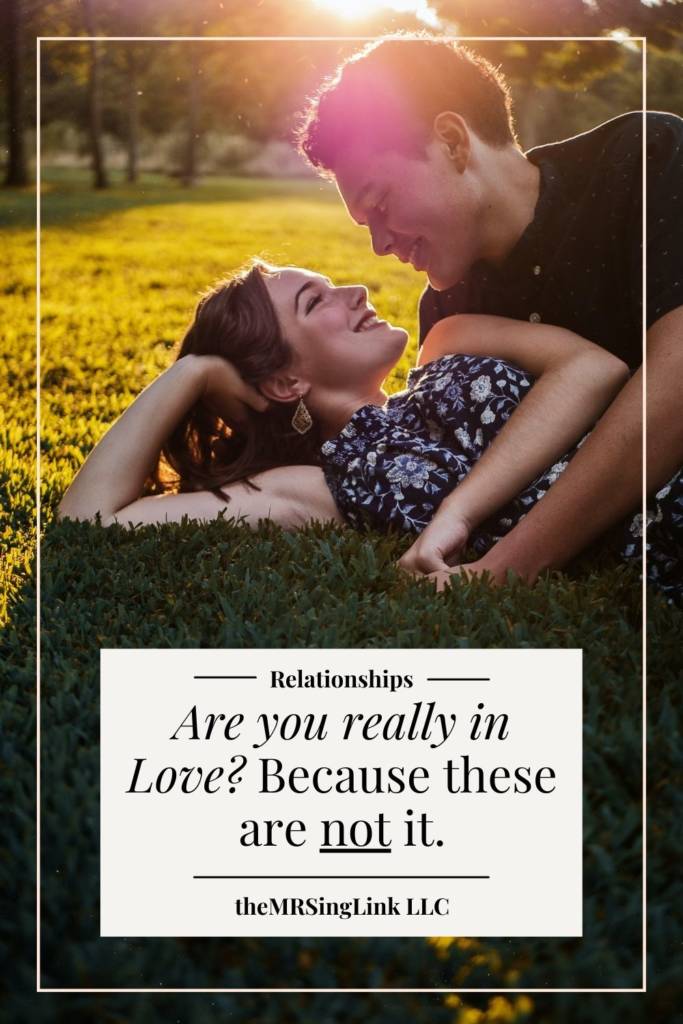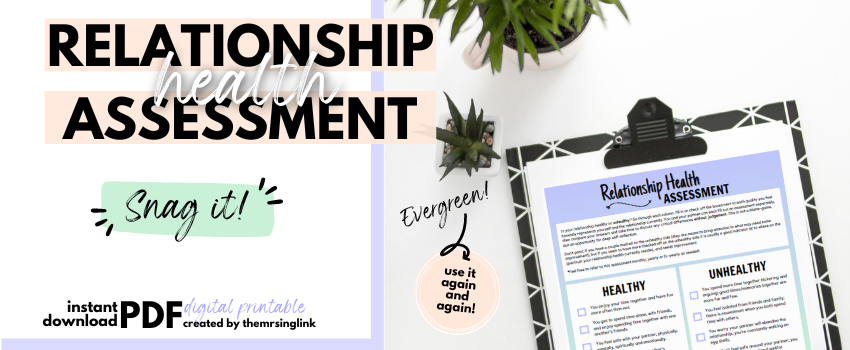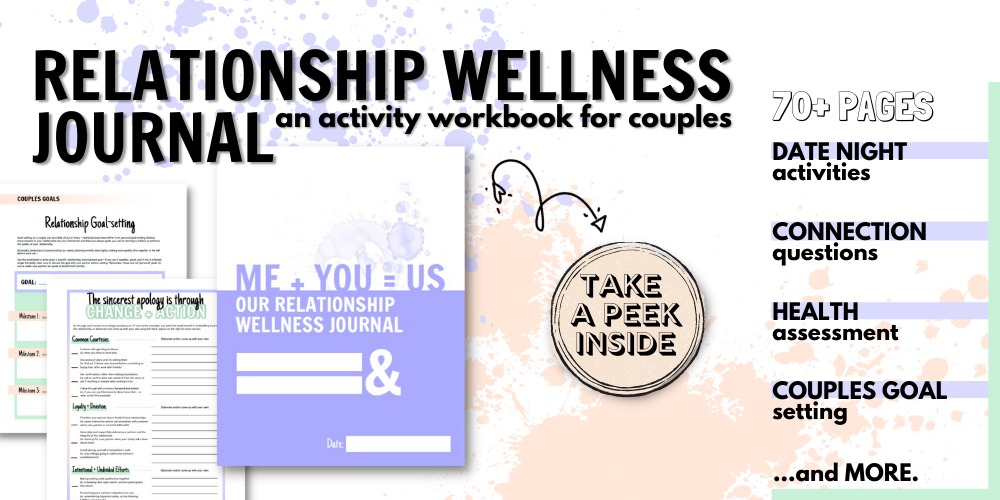Is it safe to say we tend to fall in love, or love someone, for the wrong reasons? Part of me thinks we know it, too – yee-ouch. And then we’re disappointed when Love fails us because we placed our faith in the most unpredictable, unstable aspects of what we believed to be Love.
Yeah, I’m going off on a tangent with this one. Mainly because I sincerely believe society has completely twisted and misconstrued what Love is and instead taken it to an extreme so far off the deep end. Yet, honestly, it only confirms (for me) the sad but also glorious part of the story: I don’t think we are meant to live or measure up to what Love is – only God can do that, and we will only experience that through Him.
But seriously, though, ask yourself: are you really in Love? Because these are. simply. not. it.

Are you really in love? Because these are not it.
They make you feel superficially special
In every healthy, happy relationship each individual should obviously feel “special” to their partner and vice versa, especially when you consider those whose Love Language is acts of service, words of affirmation, or gifts to feel the most Loved. But there’s still room to unpack how – *superficially* – this can give you a false sense of being in Love. For example, when they give you flowers, pick up groceries for you, surprise you with the expensive car or jewelry you wanted, take you to nice dinners or on vacations, and tell you all the sweet things you want to hear.
Listen, I am in no way invalidating that these contribute to relationship satisfaction!
BUT, those things are not the source of Love. For many, it’s easier to show love superficially, and while this isn’t considered a bad thing, you have to be careful that loving someone isn’t based on what they can/will provide you, and how much/how often they’re offering (giving) – whether that be monetarily, in words, or through actions alone.
The sex is just THAT good
Just sex, period. As we continue to live in an increasingly, hyper-sexualized society, sex is somehow everything. And honestly, it’s doing a number on shaping and redefining human behavior, connections, identity, and moral. Oftentimes I see professionals who will say, “A sexless marriage/relationship is a lonely marriage/relationship.” And while I agree to an extent, it isn’t necessarily the lack of sex that creates loneliness (disconnection). I can guarantee there are couples without “sex issues” who still feel depleted and empty (lonely).
Take away the 7 seconds of pure self-satisfying bliss/release, and what are you left with? Physical closeness (desire, intimacy), spiritual unification (soul ties, bonding, oneness), and emotional connection (safety, vulnerability, openness). You can literally achieve those things by hugging, cuddling, massaging, embracing, holding hands, kissing, and even gazing into each other’s eyes.
Sex without those components is just sex – it’s meaningless for nothing other than self-gratification. All I’m saying is how good they are in bed, or how you feel about someone based on sex or chemistry is not Love, it’s simply a human urge taking precedence over what is supposed to be intimate, special, and sacred.

The bare minimum is worth settling for
Sure, everyone probably defines the bare minimum slightly different. But can we all agree that the bare minimum simply means surviving, not thriving?
Love does not mean tolerating disrespect simply because you love them. Love also does not excuse or justify poor behavior simply because there is good. For example, they cheated, but they have been your emotional support system since your parents passed away – them being there for you emotionally does not excuse or justify the cheating.
You can hurt them without hurting yourself
I’m going to keep this one as simple as it is also likely *triggering*. If it’s easy to [lie, cheat, withhold, disrespect, retaliate, manipulate, defy, depreciate, abuse, quarrel, threaten, etc.], it’s not Love. If it makes you feel some sort of way (good, satisfied, just) to make them feel [jealous, angry, hurt, anxious, unsafe, inadequate, insignificant, etc.], it’s not Love.
When the Love (connection) is genuine, it is impossible to inflict pain on another without harming yourself in the process.
There’s never a dull, dry moment
Every, and I mean every relationship will experience that “plateau”, flatline, even boredom, or lifelessness. For me, the “dull”, dry moments are grounding – you could say they are times of rest. They are truly moments that help me to reflect and see my relationship from a raw perspective – that nothing’s perfect, relationships take work, effort won’t always equal (and isn’t going to be), and that these moments are to be treated gently and patiently. Yet, many truly believe they have never experienced a “dull” moment in their relationship while others seem to experience the continuous struggle of “boredom”. Either way, I think it’s important to discern what this means, so ask yourself:
Is your relationship truly boring and lifeless, or you actually experiencing peace? [Read more about this here.]
Or, are dull, dry moments simply manageable because the relationship’s positives outweigh its negatives (without negating the existence of one or the other)?
I see it like this. Relationships are like phases of the moon, and the right relationships are ever-evolving so they won’t stay in the same phase (because life is ever-evolving). Just as there are full moons, relationships will experience ultimate highs, and in the new moons relationships will experience hurdles and changes to overcome (good, bad, difficult, or beneficial). And the phases in between are inevitably going to experience both, including dull, dry moments.
In Love, no one phase will be a constant. Why? Because if they are, that means the relationship is not evolving, adapting (to inevitable external changes), or growing.

We never fight / Fighting brings us “closer”
1. Fighting does not equate to arguing, confronting, expressing, or disagreeing. 2. That’s not necessarily “healthy”. And 3. I can bet that neither true.
If you say you never fight, you’re disregarding every moment you fight internally with yourself (and your partner), the times you “picked your battles”, and all the things you swept under the rug to avoid/prevent further turmoil. Love doesn’t mean you won’t disagree, have conflict, share hard differences, experience/express tough feelings from/to your partner, or that you shouldn’t engage in confrontation (in order to resolve, absolve or find a solution). Through wisdom, in Love, we become capable of facing and sitting with [our] discomfort without making ourselves a martyr and an enemy of our partner.
On the flip side, if you say fighting brings you “closer”, tread lightly on that one and, again, seek discernment. Do arguments actually bring you closer, or do they only momentarily apprehend the bigger issue? Are you associating [recurring] emotional chaos (arguing and fighting) with passion/chemistry in your relationship? I’ll go there without actually going there, but there are an alarming number of couples who enjoy [living] their relationship on the edge, literally. And they unconsciously and consciously stay there, whether they’re aware of (or care about) the damage or not.
[mailerlite_form form_id=23]I know I said (and it’s widely known) that relationships experience highs and lows (some extreme highs and extreme lows), but Love is neither a rollercoaster nor a carousel. So if you want to experience genuine love in a relationship, you’re gonna have to get off the ride you’re on and exit the park.